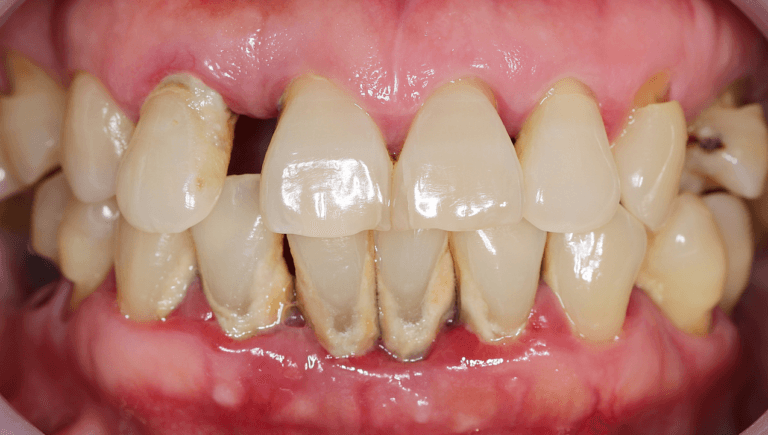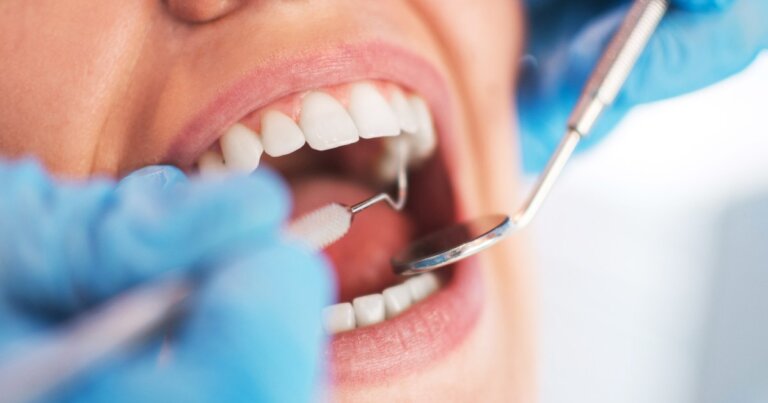Dental Calculus

What Is Dental Calculus?
Dental calculus, also known as tartar, is a hard, yellowish or brownish buildup of minerals that forms on teeth and along the gumline. It develops when dental plaque, a sticky film of bacteria, hardens over time and becomes difficult to remove. If left untreated, dental calculus can lead to oral health issues like bad breath, gum disease, and tooth decay.
Regular dental checkups, professional teeth cleaning, good at-home oral hygiene are essential to prevent calculus from building up. Before you book an appointment with your dentist in Toronto to address dental calculus, here’s what you need to know:
- Why Do I Have Dental Calculus?
- Signs And Symptoms Of Dental Calculus
- Treatment Options For Dental Calculus
- Managing Dental Calculus Until You Can See The Dentist
- Frequently Asked Questions About Dental Calculus
If you have questions about Dental Calculus or other dental problems, please contact us for more information.
Why Do I Have Dental Calculus?
Everyone develops dental plaque, but some people are more prone to having it harden into tartar. Here are common reasons why dental calculus may form:
- Poor Oral Hygiene: Inconsistent brushing and flossing can lead to plaque buildup, which eventually hardens into calculus.
- Diet: High consumption of sugary and starchy foods fuels the bacteria that cause plaque and calculus.
- Dry Mouth: Conditions like Sjögren’s syndrome or certain medications can reduce saliva, which helps wash away bacteria. Less saliva means more plaque buildup.
- Genetics: If gum disease and tartar run in your family, you may be at higher risk.
- Smoking: Smoking reduces saliva production, increases plaque, and impairs gum health.
- Age: As we age, changes in saliva make it easier for tartar to form.
Maintaining good oral hygiene, eating a healthy diet, and quitting smoking are some of the things you can do to reduce your risk. If you have further questions about Dental Calculus, please contact us.
Signs And Symptoms Of Dental Calculus
Tartar buildup can cause:
- Visible tartar deposits: Yellow or brown spots near the gumline.
- Bad breath: Persistent halitosis caused by bacteria.
- Swollen, bleeding gums: Tartar irritates gums, leading to inflammation and bleeding during brushing or flossing.
- Tooth sensitivity: Tartar near the tooth roots can make teeth sensitive to hot, cold, or sweet foods.
- Receding gums: As gums pull away from teeth, roots are exposed, leading to sensitivity and a higher risk of decay.
- Loose teeth: Advanced gum disease from calculus buildup can make teeth shift or become loose.
If you experience any of these signs, seek treatment from a dental professional right away. Early detection is key to avoiding more serious problems. If you have further questions about the signs and symptoms of Dental Calculus, please contact us.
Treatment Options For Dental Calculus
If you have dental calculus, your dentist may recommend one or more of the following treatments:
- Professional Dental Cleaning: The most common treatment, this involves scaling and root planing, where specialized tools are used to remove tartar from teeth and gums.
- Periodontal Surgery: In severe cases, surgery may be needed to remove deep tartar and repair gum tissue.
- Antibiotics: For infections associated with dental calculus, antibiotics may be prescribed.
Addressing tartar buildup with your dentist can prevent more serious dental issues down the road. If you have further questions about treatment options for Dental Calculus, please contact us.

Managing Dental Calculus Until You Can See The Dentist
If you can’t see your dentist right away, here are steps to manage symptoms and reduce further tartar buildup:
- Maintain Oral Hygiene: Follow a strict oral care routine—brush twice a day, floss, and use tartar-control toothpaste and mouthwash.
- Rinse with Salt Water: A warm saltwater rinse can soothe swollen gums.
- Cold Compress: If you experience gum swelling, a cold compress can reduce inflammation.
- Avoid Hard and Sticky Foods: These can worsen calculus buildup and gum irritation.
- Take Over-the-Counter Pain Medication: Medications like ibuprofen (Advil) or acetaminophen (Tylenol) can help manage pain. A typical dose is 1000 mg acetaminophen with 600 mg ibuprofen every 4-6 hours, as needed.
Remember, these are temporary solutions, and professional dental treatment is necessary to fully remove tartar. For more information about how to manage Dental Calculus buildup, please contact us.
Frequently Asked Questions About Dental Calculus
How does dental calculus form?
- It develops when plaque, a sticky film of bacteria, is not adequately removed through brushing and flossing, allowing it to harden due to the minerals in saliva.
Can I remove dental calculus at home?
- No, once calculus has formed, it cannot be removed by brushing or flossing and requires professional dental cleaning.
Is dental calculus the same as plaque?
- No, plaque is a soft, sticky film of bacteria, while calculus is hardened plaque that has mineralized on the teeth.
Are certain individuals more prone to developing dental calculus?
- Yes, factors such as smoking, dry mouth, crowded teeth, and certain dietary habits can increase the likelihood of calculus formation.
Dental calculus is a common but preventable oral health issue that can lead to serious complications if left untreated. Regular dental cleanings and consistent oral hygiene practices are essential to maintaining a healthy, calculus-free smile. For more information about how to manage Dental Calculus buildup, please contact us.

